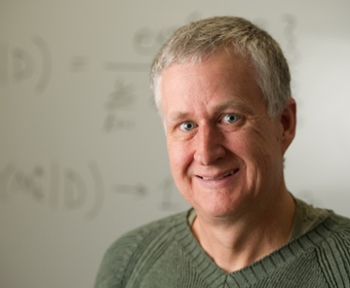Image may be NSFW.
Clik here to view. When is something proven? When has truth been established? Southern Illinois University Edwardsville’s Andrew Neath, PhD, is using his statistical expertise to answer those questions.
When is something proven? When has truth been established? Southern Illinois University Edwardsville’s Andrew Neath, PhD, is using his statistical expertise to answer those questions.
Neath, professor in the Department of Mathematics and Statistics, is the 2016 recipient of the SIUE College of Arts and Science’s distinguished William and Margaret Going Endowed Professorship Award. The coveted achievement supports his scholarship, which holds implications in scientific research, and across multiple disciplines, including law, business and medicine.
“I am incredibly honored and excited to have received this award,” Neath said. “Science is supposed to get at the truth, but does just one experiment showing a particular result prove truth? That’s the current approach. About six years ago, I began to see that the way we’re presenting things just does not hold up to deeper examination.”
Neath deems mathematics and statistics as the voice of science, and that statistics should compliment one’s knowledge. Through his scholarship, Neath is applying Bayesian statistics to the problem of scientific replicability. Broadly defined, he is studying decision-making in uncertainty.
“You can have evidence towards a truth that ends up not panning out as we look at the replication problem,” he explained. “Part of the replication crisis is that there’s a misunderstanding of randomness. There’s a misunderstanding which occurs when one experiment does not match another. There’s randomness involved.
“Rather than claiming firm belief, or claiming truth after one experiment, let’s understand the idea that belief is established only after a build up of evidence. Bayesian statistics is the best way to connect evidence with belief in a statistical analysis.”
Upon explaining his scholarship, Neath provided a long list of examples in which the distinction between belief and evidence can affect courtroom decisions, business deals and diagnostic testing in the medical industry. As part of his receipt of the Going Award, Neath will provide a public lecture where he intends to expand upon his research.
“What can you believe?” he questions. “If you can’t believe the result of a scientific experiment, then the whole scientific method is drawn into question. A lot of cutting-edge research doesn’t turn out to work, but that doesn’t mean you shouldn’t pursue it. It means that you need to take a different way of analyzing the results.”
College of Arts and Sciences Dean Gregory Budzban applauds Neath for his timely and important research, and his dedication to the teacher-scholar model that is central to the University’s values.
“This award is only bestowed on CAS faculty members who have produced outstanding scholarship and have connected that scholarship in fundamental ways to their teaching and transformed student’s lives,” Budzban said.
“Dr. Neath is an accomplished and prolific scholar in the theory and practice of statistics,” added Adam Weyhaupt, chair of the Department of Mathematics and Statistics. “Most importantly, he is bringing his research directly to our students both in the classroom and in his long history of advising master’s students. These students are out in academia, business and government today and have been profoundly influenced by Dr. Neath.”
The late Dr. William Going established the award in honor of his wife Margaret. It recognizes CAS faculty who have outstanding teaching, scholarly and/or creative activity accomplishments.
Photo: Dr. Andrew Neath, professor of mathematics and statistics in the SIUE College of Arts and Sciences.
Image may be NSFW.Clik here to view.
